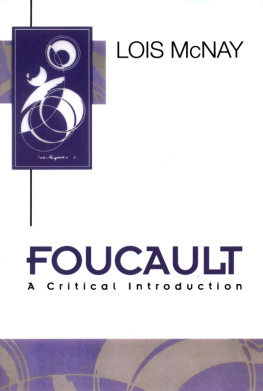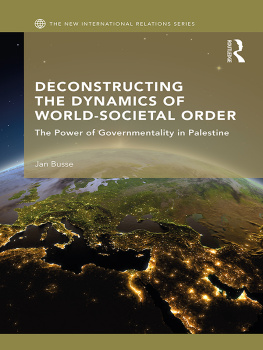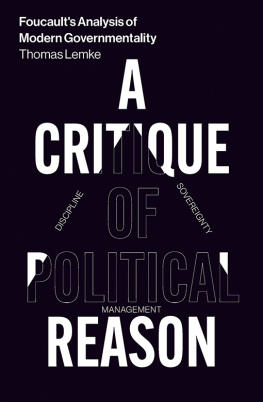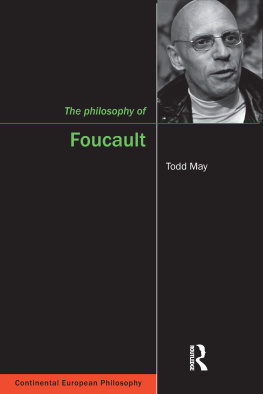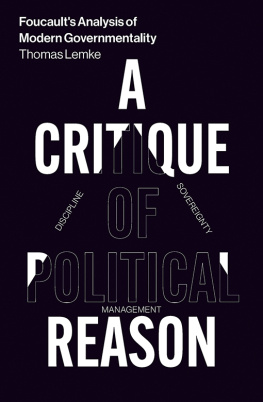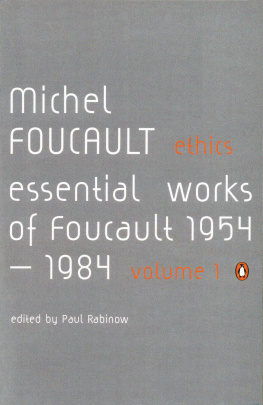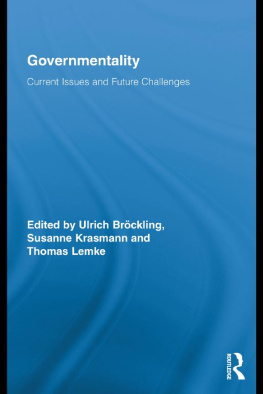Governmentality
Governmentality
Power and Rule in Modern Society
Second Edition
Mitchell Dean

Mitchell Dean 2010
First edition Mitchell Dean 1999
First Published 1999
Reprinted 2003, 2004, 2006 (twice), 2007, 2008
Second edition 2010
Apart from any fair dealing for the purposes of research or private study, or criticism or review, as permitted under the Copyright, Designs and Patents Act, 1988, this publication may be reproduced, stored or transmitted in any form, or by any means, only with the prior permission in writing of the publishers, or in the case of reprographic reproduction, in accordance with the terms of licences issued by the Copyright Licensing Agency. Enquiries concerning reproduction outside those terms should be sent to the publishers.
SAGE Publications Ltd
1 Olivers Yard
55 City Road
London EC1Y 1SP
SAGE Publications Inc.
2455 Teller Road
Thousand Oaks, California 91320
SAGE Publications India Pvt Ltd
B 1/I 1 Mohan Cooperative Industrial Area
Mathura Road
New Delhi 110 044
SAGE Publications Asia-Pacific Pte Ltd
33 Pekin Street #02-01
Far East Square
Singapore 048763
Library of Congress Control Number: 2009924821
British Library Cataloguing in Publication data
A catalogue record for this book is available from the British Library
ISBN 978-1-84787-383-5
ISBN 978-1-84787-384-2 (pbk)
Typeset by C & M Digitals Pvt Ltd India
Printed by CPI Antony Rowe, Chippenham, Wiltshire
Printed on paper from sustainable resources

For Terence and Alistair
CONTENTS
ACKNOWLEDGEMENTS
My sincere appreciation goes to my publisher, Chris Rojek, for agreeing to a second edition and to the great team at Sage for bringing it to fruition. For more reasons than I can name, I am indebted to Jennifer Porter.
Except for its first edition, this book comprises substantially unpublished material. However, parts of the section of was published in 1998 in English in the journal Soziale Welt: Zeitschrift fr sozialwissenschaftliche Forschung und Praxis 49: 2542. Passages from Michel Foucault, The Birth of Biopolitics, 2008, Palgrave, reproduced with permission of Palgrave Macmillan.
BIBLIOGRAPHICAL NOTE ON THE GOVERNMENTALITY LECTURES
The so-called governmentality lecture was first delivered in a course called Securit, territoire, population at the Collge de France on 1 February 1978. The first English publication calls the lecture On governmentality (Foucault 1979). Later English republications include that of Foucault (1991a) and Foucault (1997a: 20122). The acknowledgements of The Foucault Effect (Burchell et al., 1991: vii) state that the first publication was in Italian translation by Pasquale Pasquino, in the journal Aut aut no. 1678 (September-December 1978). The 1979 English translation by Rosi Braidotti in Ideology and Consciousness no. 6 was from that Italian version (Burchell et al., 1991: 87). The 1991 English version is revised by Colin Gordon (Burchell et al., 1991: vii) and the 1997 version is a reprint of the 1991 version (Foucault, 1997a: xiii). The lecture also has a French publication history (Foucault, 2007: 87, note) prior to its publication in its full course (Foucault, 2004b: 91118). Graham Burchells translation of the latter is now the definitive English translation and I have thus used it in this new edition (Foucault, 2007: 87114). The term governmentality lectures usually refers to the two lecture courses Foucault delivered in the spring semesters of 19778 and 19789, first published in France in 2004 (2004a; 2004b) and in English more recently (2007; 2008).
INTRODUCTION: GOVERNMENTALITY TODAY
When I originally published this book in 1999 I had attempted to write a text that would introduce the concept of governmentality derived from Michel Foucault in a reasonably clear and concise way. I also wanted to provide an overview of the field as it stood at the time. To the extent that it succeeded in these tasks, the book proved fortunate enough to attract an able readership of those who have found it helpful, along with a number of other books, in pursuing their own empirical and theoretical research. The second edition follows the structure of the first, but with the addition of this Introduction, a new chapter on International Governmentality and a Postscript. Beyond that I have allowed the greater proportion of the initial text to stand. There are, of course, corrections, additions and deletions, with the aims of clarifying the exposition and expunging any errors of fact. I have not, however, changed its conceptual and theoretical framework or basic arguments and content. If certain diagnoses have been outrun by events, that was to be expected.
I was fortunate with respect to the timing of the book. There was enough published to make governmentality an adventure but not so much as to constitute something so solid as to impose undue restrictions on an author who had appropriated the term for its title. Were such a book to be written today, it would be obliged to make close reference to Foucaults lectures at the Collge de France in 19778 and 19789, which were first published in France in 2004 and have since received the benefit of an excellent scholarly English translation by Graham Burchell (Foucault, 2007, 2008). Parts of the current edition, particularly on liberalism and neo-liberalism (in ), have done this but as a supplement rather than replacement of the original text. I think, without overstating my own modest contribution to what is now a large, collective achievement in the humanities and social sciences, that there is already enough that is distinctive in the current book for it to be put before the educated public a second time.
While I acknowledged a great number of international scholars pursuing similar themes around the term governmentality, I pursued what in retrospect would prove to be a determinedly singular path and certainly did not view myself as a member, leader or follower of a governmentality school. The book was but one marker or signpost in what I hope is a far from completed series of historico-politico-sociological studies, for want of a better name.
An attentive reader has recently remarked that the fruits of this independent path have not been sufficiently or widely acknowledged. Whether this is true or not, I shall focus here on the distinctive contribution this book makes to the field of what, for better or worse, has been called governmentality studies with no less authority than the afterword to Foucaults most relevant work on the subject (Sennelart, 2007: 390). Those singular elements of the book led me to other kinds of considerations that often questioned standard approaches not only in mainstream social and political science but also in the Foucauldian alternatives including, to some extent, aspects of these governmentality studies. The singularities already present in this book a decade ago allow me to connect it to our present. This is not so much a historical ontology, but what I would call, adapting Foucault, a critical ontology of ourselves and our present (1986b: 50; 1986c: 96).
Singularities
The reader might be struck above all by the concern in this book to place the then published fragments on governmentality within the much broader range and trajectory of Foucaults thought itself without allowing the term to congeal into a kind of dogma or become a mere social science methodology. This arose not out of an unwarranted fidelity to the founding father but from my conviction that the conceptual lucidity, methodological clarity and, above all, critical ethos of Foucaults work provided us with an extraordinary set of resources on which to build this emergent domain of study. Yet, there is much in this book that draws from the theories, concepts and research of others including those at some distance from Foucauldian perspectives. There is also much here that was drawn from my own research and empirical study. The books first singularity, then, is that it evinces a kind of wandering fidelity to Foucault with nevertheless a real attention to the precision of concepts.
Next page

